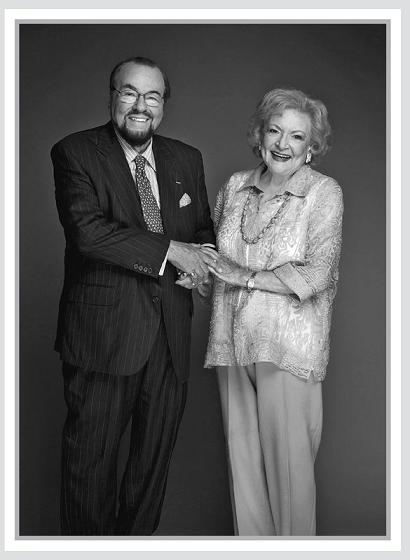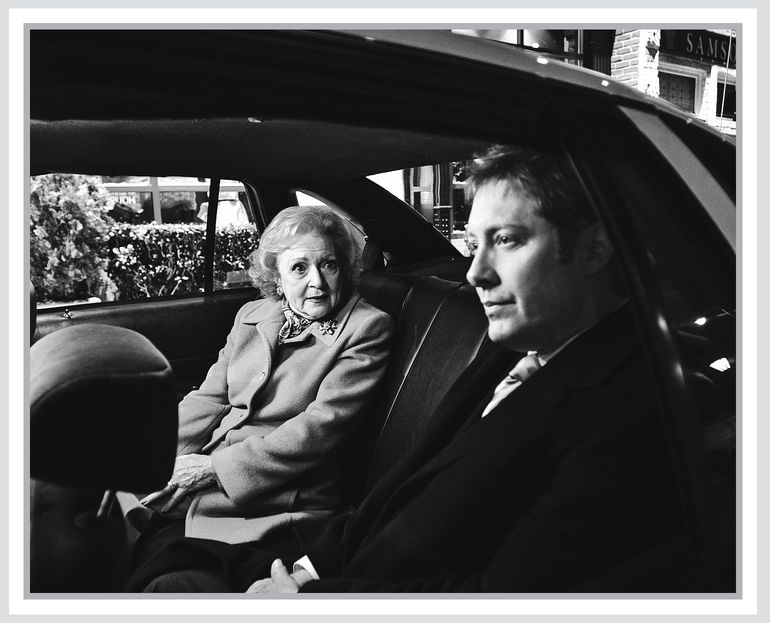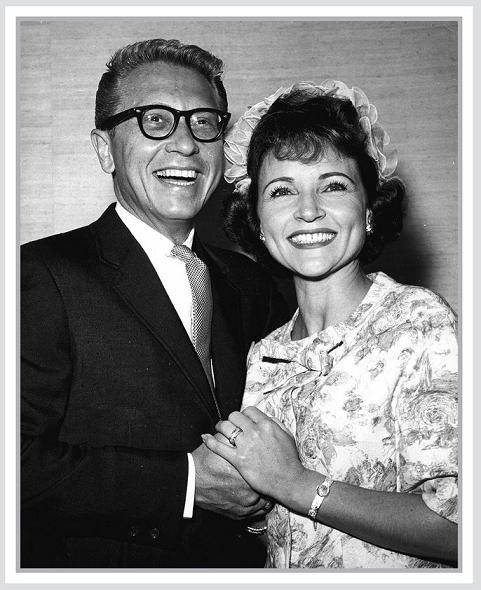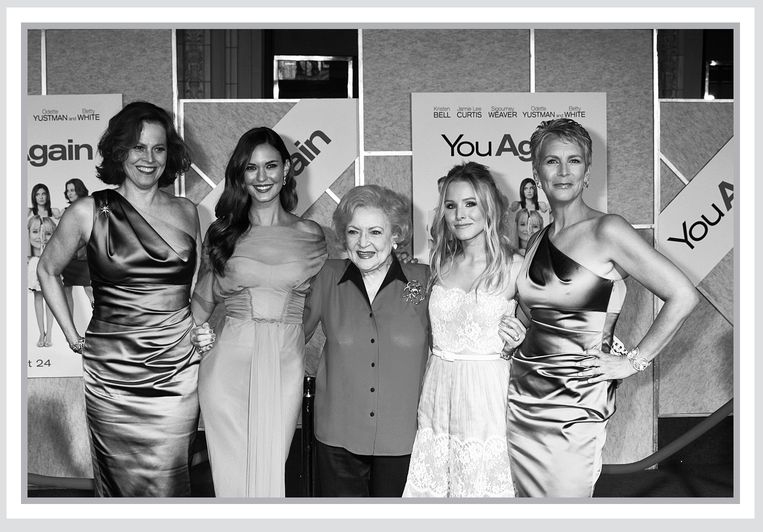If You Ask Me (9 page)
Authors: Betty White

Then I go back and start learning.
I have trouble acting with a script in my hand, so I memorize as quickly as I can to get both hands free.
Other actors that I’ve worked with are more comfortable holding their script through dress rehearsal, like a security blanket. Everyone works differently.
On a series, every week it’s inevitable that at some point someone forgets what the next line is. In front of a live audience, there is that deadly silence. You all look at one another, wondering,
Is it me?
So we just stop and start to giggle in spite of ourselves, which spreads like wildfire in the audience. We have a good (??) laugh, then we just go back a couple of lines and start where we were before.
Is it me?
So we just stop and start to giggle in spite of ourselves, which spreads like wildfire in the audience. We have a good (??) laugh, then we just go back a couple of lines and start where we were before.
Similarly, if you stumble or your tongue gets twisted, you can stop and start up again with the line before, and the editors can make their magic.
Though technology has advanced so dramatically and the equipment is better (since, say,
The Mary Tyler Moore Show
), the actors do it more or less the same according to whatever works for us, personally.
The Mary Tyler Moore Show
), the actors do it more or less the same according to whatever works for us, personally.
You go with it—and pray a lot.
Sometimes it’s not all laughs—even on a comedy set. On
The Golden Girls
just a couple of weeks into the show the first season, both my mom and Bea Arthur’s mother became seriously ill. Ironically, the script we were doing at the time happened to be heavily mother-daughter-oriented—just by coincidence. Two weeks later, both our mothers were gone. Not an easy time.
The Golden Girls
just a couple of weeks into the show the first season, both my mom and Bea Arthur’s mother became seriously ill. Ironically, the script we were doing at the time happened to be heavily mother-daughter-oriented—just by coincidence. Two weeks later, both our mothers were gone. Not an easy time.
Line readings are always a challenge. When the line falls right, you feel it in your gut.
That’s
how you intend to do it from then on. But just try to repeat it—you can’t get it back to save your soul from perdition. Now and then, that “good line reading” doesn’t happen until you’re driving home after the show. But, of course, the party’s over by then.
That’s
how you intend to do it from then on. But just try to repeat it—you can’t get it back to save your soul from perdition. Now and then, that “good line reading” doesn’t happen until you’re driving home after the show. But, of course, the party’s over by then.
I’ve heard some of the best actors say the same.
It’s a strange craft!

With James Lipton on
Inside the Actors Studio
.
Inside the Actors Studio
.
BRAVO/PHOTOFEST
TELEVISIONO
ver time, I’ve turned down three Broadway shows. I love summer stock. But with summer stock, there’s a beginning and an end to the production. Maybe a week’s rehearsal and three or four weeks playing the show, then you’re free.
ver time, I’ve turned down three Broadway shows. I love summer stock. But with summer stock, there’s a beginning and an end to the production. Maybe a week’s rehearsal and three or four weeks playing the show, then you’re free.
If you get into a Broadway show and it doesn’t work, you’re a failure. And if it does work, you may be stuck for who knows how long. It just doesn’t sound great to me!
My theatrical friends think I’m a Neanderthal.
“It’s
THEATER
,” they protest.
THEATER
,” they protest.
“I know,” I say, “but I’m
television
!”
television
!”
I was there when television first started. We grew up together.
When I graduated from high school, television had just begun in New York, but it hadn’t yet started in California.
I had done our senior play and was asked to do an experimental television show downtown. Our senior class president and I did a scene from
The Merry Widow
up on the fifth floor of the Packard Automobile building. And it was broadcast all the way to the bottom floor. My parents had to stand in front of a tiny little monitor on the first floor to see me! But it was the beginning of television in Los Angeles.
The Merry Widow
up on the fifth floor of the Packard Automobile building. And it was broadcast all the way to the bottom floor. My parents had to stand in front of a tiny little monitor on the first floor to see me! But it was the beginning of television in Los Angeles.
Then I actually got paid (a little) to do a role as the girl behind the hotel desk on a show called
Tom, Dick, and Harry
. Never do a show with three comics who have a broom. But it was fun.
Tom, Dick, and Harry
. Never do a show with three comics who have a broom. But it was fun.
Al Jarvis had seen me on that, and he called and asked if I would be his Girl Friday on a TV show he was going to do. Al had had a marathon radio show, and now he was going to be on for five hours, five days a week. They soon upped it to five and a half hours a day and added Saturday. That was
Hollywood on Television
. I’d been getting paid $5 by the local station.
Hollywood on Television
. I’d been getting paid $5 by the local station.
When Al called, I thought,
Maybe I’ll get another $5!
Maybe I’ll get another $5!
Instead, Al offered me $50 a week! I was shocked. Even more so when they gave me $200 per week when they extended the airtime.
For two and a half years we worked together on that program. And then, Al went over to ABC, and I inherited
H.O.T
.
H.O.T
.
You talk about experience—it was like going to television college.
One of the things I realized from the first time I ever did television was the intimacy of the audience. There are never more than two or three people watching a television program—if there are more than three people in a room, they’re usually talking among themselves, not listening to you! So as a television actress, I knew my audience was always very narrow. Later, when I did movie roles, however, it was for this great big audience. And I didn’t know that audience’s content at all. You don’t have that feeling of reaching an individual. And you
don’t
look at the camera!
don’t
look at the camera!
No matter how television has grown, you’re still really just talking to those two or three people.
People greet me on the street as a friend, not a celebrity. “Hi, Betty!”
I was walking down the street the last time I was in New York, and a guy drove by and rolled down his window and hollered, “I love
Hot in Cleveland
, Betty!” Had I been a film star, he wouldn’t have done that.
Hot in Cleveland
, Betty!” Had I been a film star, he wouldn’t have done that.
There’s a remoteness to film stars. As an accessible television performer, you have to be careful walking down the street—you might pick up a hundred new best friends. It’s so unlike film stars, it’s a different genetic makeup.
Television and I discovered each other together. It was a very short window to get in, timing-wise.
I was blessed with that timing, because we were inventing as we went along in those first days of television. And I joined the parade.

On
Boston Legal
with James Spader.
Boston Legal
with James Spader.
RON TOM/© FOX/COURTESY: EVERETT COLLECTION
LOVE AND FRIENDSHIP

Our wedding day
—
June 6, 1963.
—
June 6, 1963.
GLOBE PHOTOS
FULL CIRCLEL
ife does have a way of coming full circle.
ife does have a way of coming full circle.
As of this writing, I have just finished shooting a movie (
You Again
) starring three great gals—Jamie Lee Curtis, Kristen Bell, and Sigourney Weaver. I thoroughly enjoyed working with all three but got a special kick out of getting to know Sigourney. It was her father, Pat Weaver, who was at the time the president of NBC, where I got my first network job (
The Betty White Show
) more than half a century ago.
You Again
) starring three great gals—Jamie Lee Curtis, Kristen Bell, and Sigourney Weaver. I thoroughly enjoyed working with all three but got a special kick out of getting to know Sigourney. It was her father, Pat Weaver, who was at the time the president of NBC, where I got my first network job (
The Betty White Show
) more than half a century ago.
After several years of doing local television, going “national” was a major turning point in my career, and it was a dream come true.
At the time, I was working five and a half hours a day, six days a week, with Al Jarvis in a live broadcast. No script—all ad-libbed—on KLAC’s Channel Thirteen in the local Los Angeles area. The show was called
Hollywood on Television
.
Hollywood on Television
.
After two years, Al left and I inherited the show and worked solo for two and a half years. Every Thursday night I was also doing a one-hour variety show that was something like a small-scale
American Idol
(like they say, there’s nothing entirely “new” in this world!). It was all local. People would come on the Thursday-night show and sing, and whoever won the variety show, whoever got voted the best performer, would have a week appearing on our daytime show. Here I should mention that I would sing, too—and I don’t know how they could tell me from the amateurs!
American Idol
(like they say, there’s nothing entirely “new” in this world!). It was all local. People would come on the Thursday-night show and sing, and whoever won the variety show, whoever got voted the best performer, would have a week appearing on our daytime show. Here I should mention that I would sing, too—and I don’t know how they could tell me from the amateurs!
So after the five-and-a-half-hour daily broadcast on KLAC, we would hold auditions to screen the candidates for the variety show. They’d sing for us, and some you wouldn’t believe—you just didn’t know where to look. You’d think,
This is the longest song that was ever sung!
And you felt so sorry for these people. . .. But sometimes we’d get lucky. The most memorable winner was a young Gogi Grant, who went on to achieve a great career.
This is the longest song that was ever sung!
And you felt so sorry for these people. . .. But sometimes we’d get lucky. The most memorable winner was a young Gogi Grant, who went on to achieve a great career.
On
Hollywood on Television
, we finally got music—a guitar player named Roc Hillman. I would sing three songs each day to his accompaniment.
Hollywood on Television
, we finally got music—a guitar player named Roc Hillman. I would sing three songs each day to his accompaniment.
Then came Pat Weaver’s job offer, which was a godsend. Pat warned me what it would entail:
“Do you think you can handle doing a half-hour show every day, five days a week?”
Well, after five and a half hours a day, six days a week, I wondered what I would do with all the time off! I would also have a five-piece band, led by well-known music man Frank De Vol. Roc Hillman, of course, was still on guitar.
Pat Weaver was a real mover and shaker in the television business, and many of his innovations are still extant today. It was Pat, I believe, who first divided television time into segments like on the
Today
show and
The Tonight Show
.
Today
show and
The Tonight Show
.
Little did I dream that all these years later I would be working with his star of a daughter. Sigourney wasn’t even a gleam in her father’s eye at that time.
Nice as he was, I was in total awe of Pat when I worked for him back then. I must admit, at first I felt a bit of the same when I started working with Sigourney, since I have been a devout fan of hers, especially her fine performance as Dian Fossey in
Gorillas in the Mist
.
Gorillas in the Mist
.
I am delighted to say that we have grown into warm and loving friends. You can’t imagine how thrilled I was when I came offstage after
Saturday Night Live
to find her waiting to say hello in my dressing room. She and Victor Garber (also in
You Again
) had come over to surprise and support me. These are moments I absolutely cherish.
Saturday Night Live
to find her waiting to say hello in my dressing room. She and Victor Garber (also in
You Again
) had come over to surprise and support me. These are moments I absolutely cherish.
But it doesn’t stop there.
The day before the SAG Awards in 2011, I was at an event and a gentleman approached me and introduced himself. He said, “I’m Roc Hillman’s son! My dad’s still alive!”
I said, “You’ve got to be kidding me!”
He said, “No, he’s one hundred and four, and he’s still going!”
Like I said, life sure does have a way of coming full circle.

On the set of
You Again
with Sigourney Weaver, Odette Yustman, Kristen Bell, and Jamie Lee Curtis.
You Again
with Sigourney Weaver, Odette Yustman, Kristen Bell, and Jamie Lee Curtis.
Other books
The Zeuorian Awakening by Cindy Zablockis
How to Read an Unwritten Language by Philip Graham
Falling for the Secret Millionaire by Kate Hardy
Stalker's Luck (Solitude Saga Book 1) by Strange, Chris
Pie A La Murder by Wells, Melinda
The Case of the Stuttering Bishop by Erle Stanley Gardner
Once Upon a Prince by Rachel Hauck
Solar Dare by Xander, Tianna, Grace, Viola
When in Bruges (Humorous Romantic Mystery) by Nic Saint
Voices in the Dark by Lacey Savage